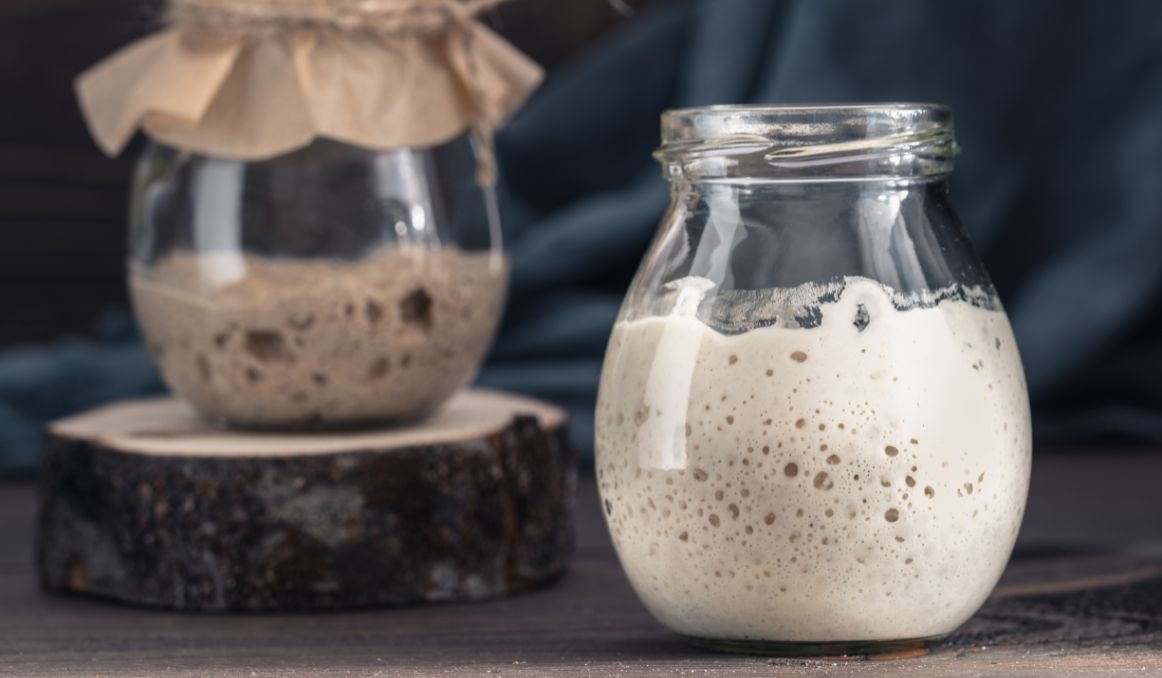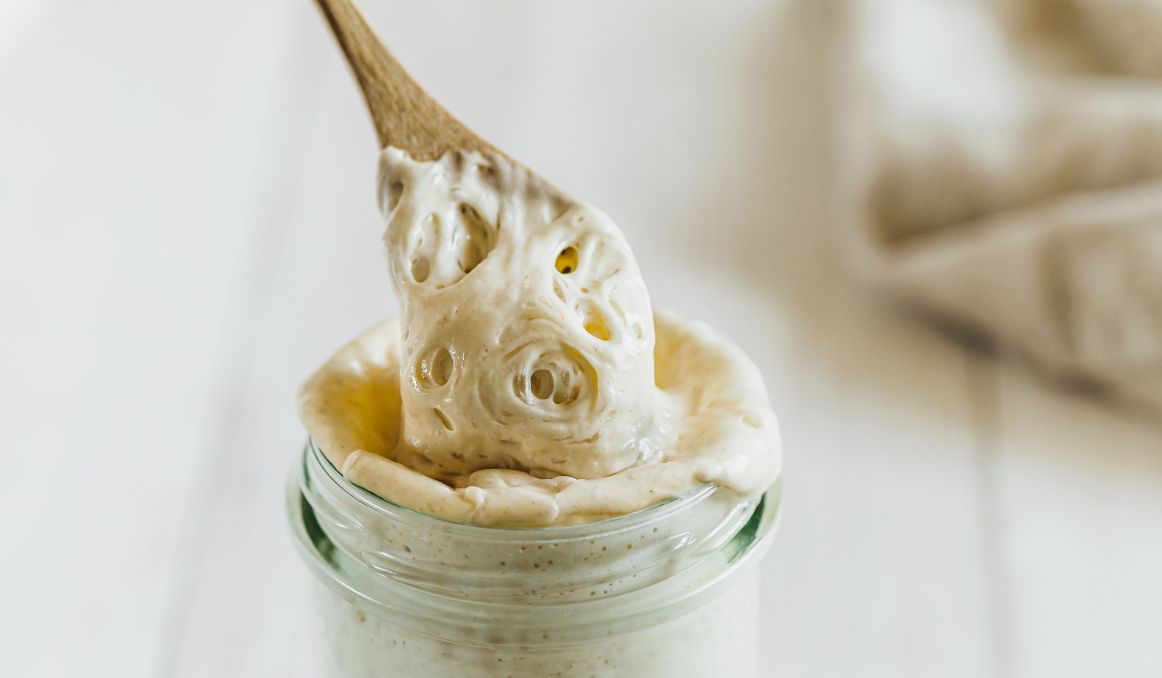Should Sourdough Starter Smell Like Beer?
Should sourdough starter smell like beer? That’s an interesting topic and actually a common question because, in fact, sometimes your sourdough starter will smell like beer.
Why?
It has to do with the yeast, the bacteria, and feeding.

Yeast and Bread
While yeast has been around for likely millions of years, it has not always played a role in bread.
At first, yeast simply hung around in the atmosphere doing the one job it was made to do – seek out sugar.
A single celled eukaryotic living organism that is part of the fungus family, yeast really only has that single purpose. So simple, yet so gratifying to humans.
And to other animals as well, in fact.
Anthropologists have found that long before humans were counting on yeast for wine, bread, and beer, monkeys were waiting for fruit to ripen and fall from the tree, and for the yeast in the environment to be attracted to these strong naturally occurring sugars and convert them to alcohol.
The monkeys would then partake of this alcoholic fruit and have drunken weekends.
Later, they discovered how to tap palm trees for their sap and leave the sap out to ferment.
Cue more drunken monkey weekends.
It is no wonder then that humans also discovered the wonders of yeast, even if we did not know what yeast was at the time.
It was in ancient Egypt, around 3,000 BC, that a woman left what she thought would be unleavened bread, like all bread was at the time, out for several days, only to return and find it had risen.
You see, unlike in fruit, where yeast can consume the sugars and convert them to alcohol and carbon dioxide and then the CO2 will simply dissipate into the atmosphere, bread dough traps the CO2.
So, when bread dough is left out, the yeast in the atmosphere is attracted to the naturally occurring sugars deep in the starches of the grain, and it will dig deep to consume those sugars.
However, when the sugars are converted to alcohol and carbon dioxide in this case, it cannot simply dissipate, so it pushes against the dough, which is what causes the rising process to take place.
Of course, the alcohol is all baked off in the oven.
From that time, we have had lovely, fluffy, risen bread, sourdough perhaps the most popular among them.
Sourdough

Sourdough was the first among the leavened breads in the world, by a longshot, and for good reason.
You see, when that woman, and all bakers after her, left their bread out to rise, yeast was not the only thing attracted to the sugars.
The key ingredient in sourdough that makes it “sour” and that differentiates it from all other breads, is the lactic acid bacteria.
Together, the yeast, saccharomyces cerevisiae and the bacteria feed on the sugars in the flour and water mixture and create a startling combination of alcohol, carbon dioxide, and hundreds of other micronutrients that make sourdough perhaps the healthiest bread you can eat.
If you are a sourdough baker today, in this changing climate that has become much more health conscious and aware of issues like gut health and the brain body connection, you are in the right business.
You can tell your loyal customers that not only is your bread delicious, but it is also highly nutritious – a claim many other bread makers cannot make.
Especially in light of the shift away from almost all things gluten, the fact that sourdough has tremendous benefits to your health is a huge selling point.
And it is all because of that yeast and bacteria combo.
Unlike with other breads, sourdough is made from a natural leavening process, which means you created your own starter by allowing naturally occurring yeast and bacteria to be attracted to your flour dough.
Over the initial process of creating that starter, bad bacteria also attacked your dough, but as always happens in nature, the good bacteria fought off the bad bacteria.
This is only one of the reasons sourdough is so good for you.
Gut Health
Like all fermented foods, the good bacteria feed your gut and then fights off bad bacteria in your gut, giving you overall better gut health.
And good gut health is the key to all other good health in your whole body and mind.
That fermentation process also unlocks B vitamins in the bread, which help with your energy metabolism.
Digestion and Allergens
Sourdough is also good for digestion. Even though it is not gluten free, at least one study shows that eating sourdough will actually help with the digestion of gluten.
Indeed, other studies show the lactic acid bacteria in sourdough may help moderate allergic reactions, inflammation, and auto-immune disease!
Healthy Aging
A study in Aging Clinical & Experimental Research shows that the fermented whole grains in sourdough bread contribute to a lower risk of heart disease, diabetes, and cancer for older adults.
Blood Sugar
And finally, sourdough is full of complex carbohydrates, which have a lower glycemic index and glycemic load than white bread or whole wheat bread that is not fermented, and it is also higher in fiber.
So your blood glucose takes a smaller hit with sourdough than with other breads.
But… Beer Smell?
Now you know you not only have a delicious bread to sell your customers, but also a highly nutritious one.
But, still, why would our sourdough starter smell like beer, alcohol, or even nail polish remover?
Blame the bacteria.
During the fermentation process, the good bacteria in your starter is so busy fighting off bad bacteria that it needs to be fed regularly.
If you miss a feeding, or a few feedings, that good bacteria will start to release acetic acid as a sign of stress, and that will create the alcohol scent you are picking up. That alcohol scent, combined with the natural grainy, bready smell that your sourdough starter typically has, results in a scent that resembles that of beer.
It’s as simple as that.
All you have to do is get back on your regular feeding schedule, and maybe even add an extra feeding for a couple of days, and your starter will get back on track.
Cheers!
Passionate about yeast fermentation and all the wonders it can do? So are we! If you’re interested in finding out how you can use our technology to control fermentation and monitor your yeast, save work hours and improve the cost-efficiency of your business, drop us a line at [email protected]
Also, check out these product pages, if you’re into beer or wine making:
- Oculyze BB 2.0 (Better Brewing) Yeast Cell Counter App + Hardware
- Oculyze FW (Fermentation Wine) Yeast Cell Counter App + Hardware
…or our custom solution page for other use cases (yours included):
Sources:


